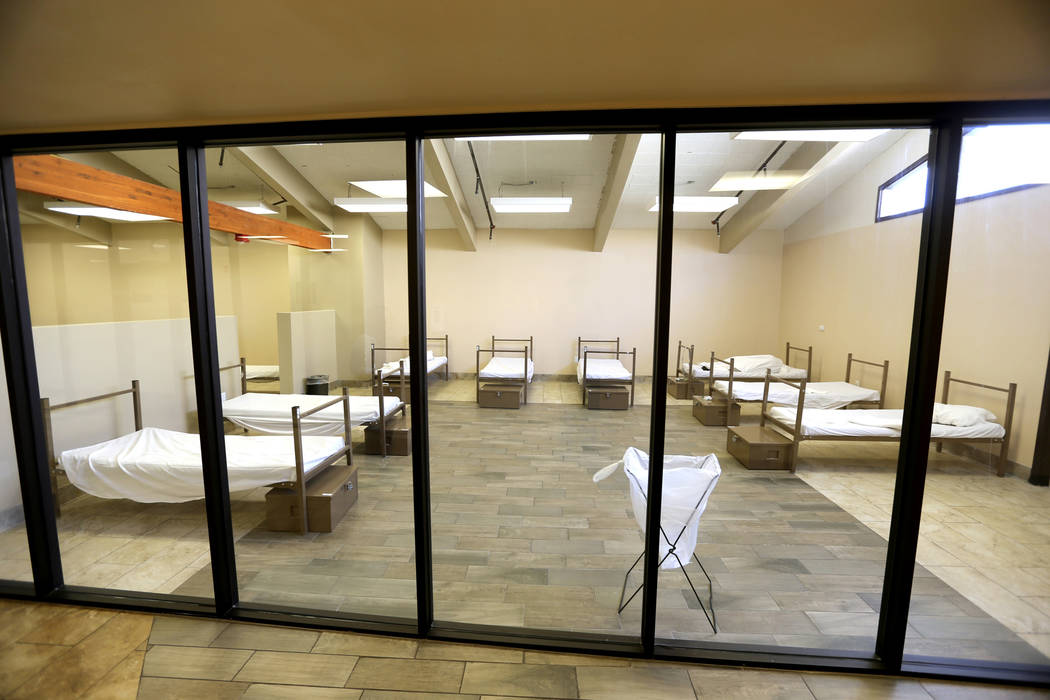Clark County demands answers from WestCare in funding dispute

Clark County commissioners appeared frustrated Tuesday when representatives of WestCare, a national nonprofit addiction treatment group that has threatened to close its Las Vegas clinic, couldn’t answer questions about how it funds and administers care.
WestCare has threatened to close its Community Triage Center at 323 N. Maryland Parkway, the only detox treatment facility in Las Vegas, by the end of the month because of a funding dispute with local governments, hospitals and the state Department of Health and Human Services. WestCare had been receiving funding for the clinic through an “interlocal agreement” that expired June 2016, though it continued to serve clients and receive some funding after that date.
Commissioners said Tuesday that closing the WestCare clinic, following the closure of similar treatment centers in Las Vegas and Reno, could create a gap in services for the city’s most vulnerable.
“If it’s all about money, let’s get down to the nitty-gritty,” Commissioner Lawrence Weekly said. “We all have a responsibility to step up to the plate and not make this about money.”
Audit found double-billing
He was referring to a county audit completed in January that showed WestCare owed the county about $1 million in credit for care also covered by Medicaid reimbursements. Since the audit’s release, commissioners said the county has been working unsuccessfully to negotiate a new funding agreement with WestCare.
WestCare would need up to $1.5 million to cover uncompensated costs from fiscal year 2018 and an additional $759,000 to cover the first half of fiscal 2019, WestCare consultant Dan Musgrove said at Tuesday’s meeting.
Almost half of WestCare’s services are uncompensated, either because clients have no insurance or have high-deductible plans and are unable to pay their portion of the bill. While the detox center has said it will add a state enrollment coordinator five days week to help clients enroll in Medicaid, that may only bring down the uncompensated rate slightly because many clients fear sharing their information with the government, said WestCare’s Executive Vice President Peggy Quigg.
“We may have just gotten a little ahead of ourselves thinking Medicaid is the end-all, be-all that we all want it to be,” Quigg told commissioners.
The center has operated with funding from “interlocal agreements” since 2002. Initially, the entities agreed on $3.6 million a year for the center. But funding was reduced to $2.8 million in 2008, according to WestCare.
When the contract expired in June 2016, Musgrove said WestCare figured payments would continue, even if a contract wasn’t signed until the county’s audit was completed. It wasn’t unprecedented for extensions of the contract to be delayed — but agreements were always established in the end, he said.
“We need someone to tell us how they’re going forward because we’re just a vendor. This is a community project,” Musgrove said. “They need to decide how they want to fund it.”
Client fears consequences
Without the detox center, Mike Lee, a WestCare alumnus, wonders whether those seeking long-term treatment would have a place to start.
Lee, 46, has been sober 17 months after a years-long battle with a methamphetamine addiction. He started his journey at WestCare’s detox center in March 2016 before transitioning to the organization’s men’s residential treatment center, Harris Springs Ranch, on Mount Charleston.
“It’s the only place that gives people a chance,” he said.
Before any agreement with WestCare is considered, commissioners want more answers. They invited representatives of the nonprofit to return to the May 15 commission meeting prepared to deliver additional information on how many clients it serves, the cost of uncompensated care and how WestCare keeps patients from becoming “frequent fliers” — repeat detox center visitors — through case management services.
County Commissioner Chris Giunchigliani also asked whether other detox center providers could replace the services WestCare provides. Two providers have applied for licenses from the state, she was told by staff.
“I don’t think you guys honestly answered anybody’s question today,” Commissioner Marilyn Kirkpatrick said. “I don’t think you gave us enough detail to make an educated decision.”
Contact Jessie Bekker at jbekker@reviewjournal.com or 702-380-4563. Follow @jessiebekks on Twitter.